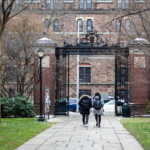Federal courts uphold affirmative action in SFFA case that parallels Yale lawsuit
Students for Fair Admissions loses North Carolina lawsuit ahead of SCOTUS decision

Yale Daily News
On Oct. 18, federal judge Loretta Biggs of Winston-Salem ruled against Students for Fair Admissions, affirming the University of North Carolina-Chapel Hill’s right to employ race conscious admissions and potentially setting a precedent for SFFA’s similar legal challenge against Yale.
Students for Fair Admissions, or SFFA, is an organization seeking to end affirmative action through legal challenge. The organization filed against the University of North Carolina-Chapel Hill, the University of North Carolina, or UNC, system and the UNC Board of Governors in 2014 for violating the equal protection clause of the Fourteenth Amendment to the Constitution and Title VI of the Civil Rights Act of 1964 by using race as a factor in admissions decisions. The group filed a similar complaint against Yale in Feb. 2021.
“Yale applauds the [UNC] decision, which reaffirms forty years of Supreme Court precedent holding that universities may consider race and ethnicity as part of a review process designed to obtain the crucial educational benefits that flow from a diverse student body,” Jeremiah Quinlan, dean of Undergraduate Admissions and Financial Aid, told the News.
SFFA has launched multiple lawsuits against universities in the hopes of overturning affirmative action policies, which the organization believes unfairly advantage Black and Latinx applicants over their white and Asian American counterparts.
SFFA is the plaintiff in the high-profile case against Harvard University, which alleges that Harvard discriminates against Asian American applicants in its admissions procedure. Two courts have so far ruled in Harvard’s favor, and the Supreme Court is expected to soon announce whether it will hear the case.
Since the Harvard case has been in litigation since 2014, SFFA has unsuccessfully sued the University of Texas system — and now UNC-Chapel Hill.
“UNC-Chapel Hill’s racial preference for each underrepresented minority student (which equates to a penalty imposed upon white and Asian-American applicants) is so large that race becomes the ‘defining feature of his or her application,’” the SFFA complaint against UNC reads. “High-achieving Asian-American and white applicants are as broadly diverse and eclectic in their abilities and interests as any other group seeking admission to UNC-Chapel Hill.”
SFFA’s ongoing lawsuit against Yale alleges similarly discriminatory behavior on behalf of Yale.
Derek W. Black, a law professor at the University of South Carolina and expert on education policy, said that nothing will change for UNC based on this ruling.
Black added that affirmative action does not correct for past discrimination. Addressing past discrimination would necessitate “something much more aggressive and robust” than affirmative action, he said. Rather, the practice allows all students to grow from learning in a diverse environment.
“Exposure to diverse views and diverse actions benefits every single student,” Black said. “Diversity programs are not zero sum games.”
Quinlan echoed this sentiment, claiming that the wide array of student backgrounds on campus “enriches Yale’s community in immeasurable ways.”
SFFA’s lawsuit against Yale specifically claims that University admissions policies violate Title VI of the 1964 Civil Rights Act, which refuses federal funding to any institution that discriminates on the basis of race, color or national origin. The United States Department of Justice sued Yale on the same grounds in October 2020, but dropped the lawsuit once President Joe Biden took office.
“Yale, Harvard, the University of North Carolina, the University of Texas and many dozens of other highly competitive colleges and universities employ admissions practices that are discriminatory, unnecessary, and unconstitutional,” Edward Blum, who heads SFFA, wrote in a press release about the Yale suit.
Blum declined multiple requests to comment on losing the UNC case. SFFA’s attorney in the Harvard case, Adam Mortara, also declined to comment.
Yale Law professor Justin Driver called the UNC ruling “unsurprising” and explained that SFFA lawsuits are generally intended to raise the constitutionality of affirmative action within the Supreme Court, so lower court decisions generally do not hold much bearing.
The Supreme Court is set to decide whether or not to take on SFFA v. President And Fellows Of Harvard College — and therefore the future of affirmative action — within the next few weeks upon a call for the view of the solicitor general, or CVSG.
On May 13, the Connecticut District Courts agreed to a petition to hold SFFA’s case against Yale until the country’s highest court issues a ruling in the Harvard suit.
Black said he believes the court has “no basis” to overturn affirmative action, but refrained from predicting their decision.
According to Driver, if the Supreme Court takes the case, the three left-leaning justices will likely support affirmative action, but whether or not two of the five conservative-appointed justices will rule on behalf of the practice remains “the $64,000 question.”
The Supreme Court upheld affirmative action in Fisher v. University of Texas, another case Blum spearheaded, in 2013.










